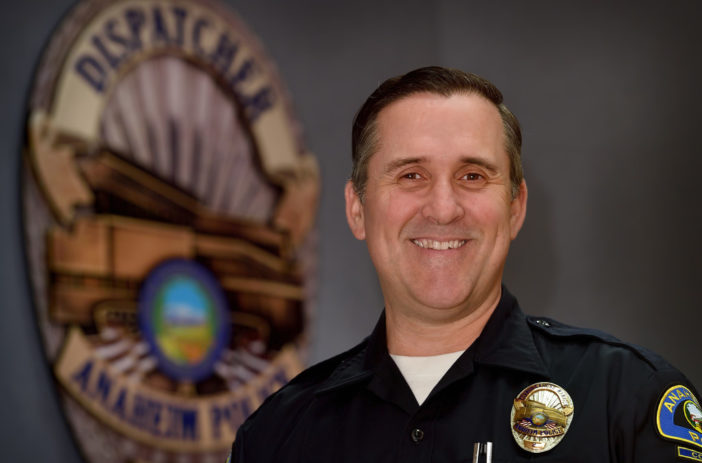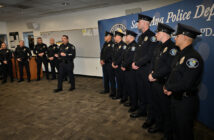The woman’s screams were terrifying.
The anguished wails were all that Anaheim PD Dispatcher Heather Champlin heard when she took the 911 call.
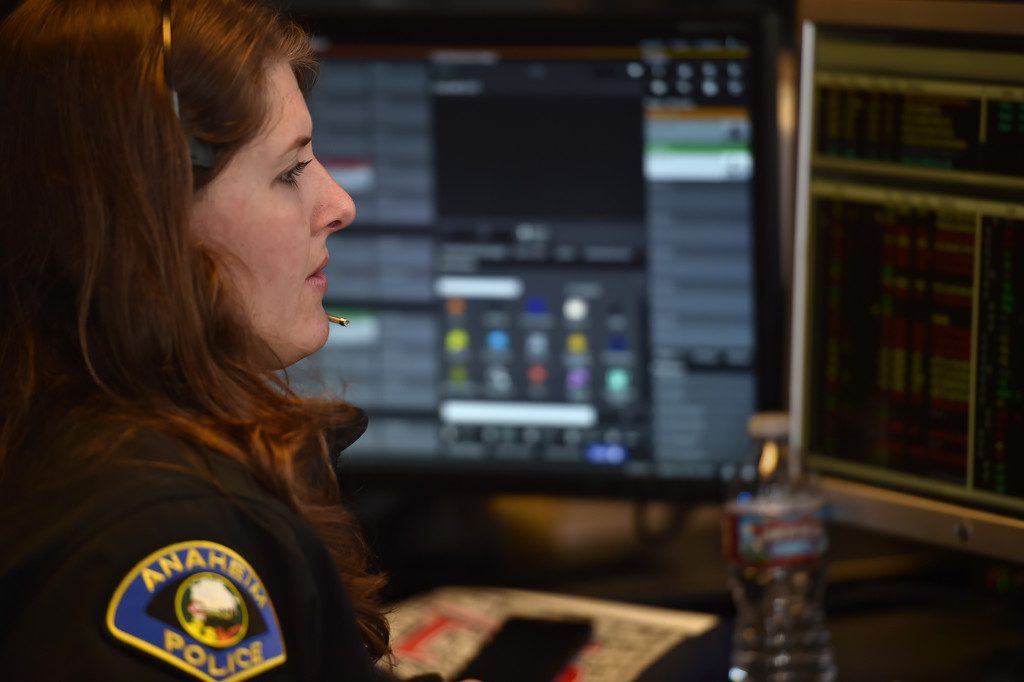
Dispatcher Heather Champlin takes calls at a 911 dispatch station at Anaheim PD. Photo by Steven Georges/Behind the Badge OC
Champlin wondered if the woman had been violently attacked.
Since she had called from a landline, the caller’s address popped up on Champlin’s screen.
After several seconds that seemed to stretch into minutes, Champlin finally was able to get the caller to tell her what was wrong.
“There’s a rat in my house!”
Police dispatchers pretty much have heard it all.
With today, April 9, marking the start of National Public Safety Telecommunicators Week, which runs through April 15, Behind the Badge met with APD dispatchers and their managers about a profession that obviously is critical to law enforcement, but often misunderstood by the general public.
Stories?
Dispatchers have tons of them, from the funny — like the rat-phobic woman, or the 911 calls that come every Thanksgiving about how to cook a turkey — to the heartbreakingly tragic.
And dispatchers often are at the receiving end of streams of profanity-laden invective, such as when callers from around the country recently flooded APD phone lines to criticize an off-duty LAPD officer who fired his gun during a confrontation with a group of teenagers in his front yard.
Through it all, police dispatchers are tasked with remaining calm, cool and courteous.
“Dispatchers are the unsung heroes (of the police department),” said Kurt Wallace, Communications Manager, Support Services Division, APD. “They are the ‘first first responders,’ and the calming voice in the storm.”
Added Wallace, who started at the APD as a dispatcher in 1997 and has managed the unit since January 2009: “It’s a very difficult job, but it’s rewarding in that we truly make a difference.”
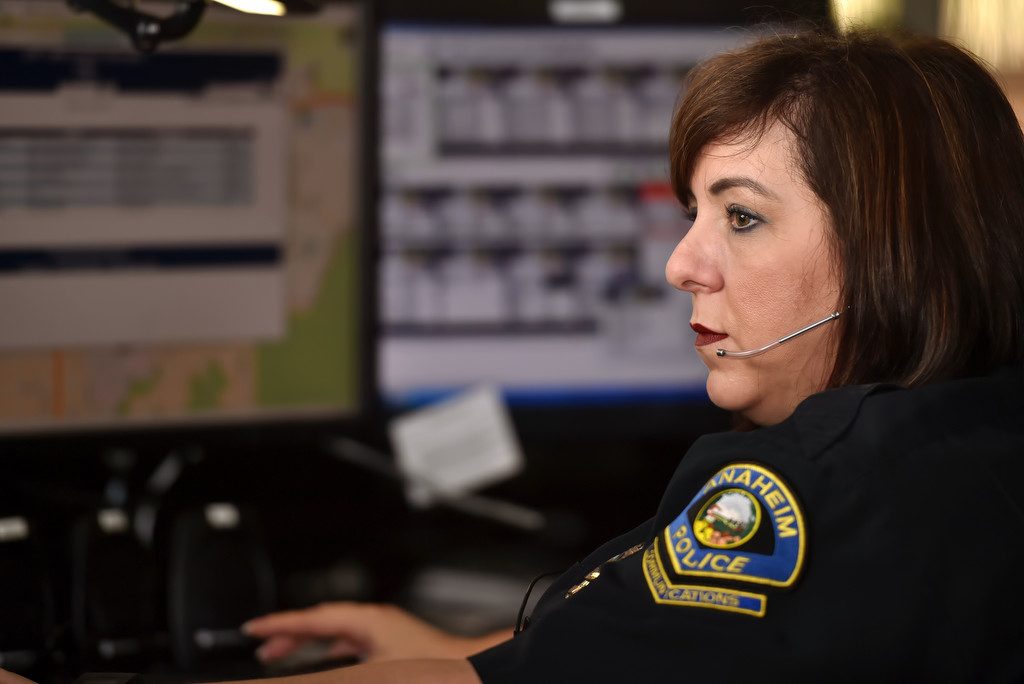
Dispatcher Lesley DiBenedetto works on one of the 911 dispatch stations at the Anaheim PD. Photo by Steven Georges/Behind the Badge OC
During National Public Safety Telecommunicators Week, patrol officers typically visit dispatchers to tell them how much they’re appreciated.
Their bosses set up taco and breakfast bars, and during the week dispatchers are allowed to wear civilian clothes to work instead of their dark-blue wool uniforms.
For these seven days, APD dispatchers will take all the love they can get.
“To me, having been a deputy and then coming here, this job is harder,” said Rick Johnson, a dispatcher at the APD for 10 years. Johnson previously was a deputy for the Los Angeles County Sheriff’s Department. An injury forced him to medically retire after seven years.
“As a deputy, you’re on one call at a time, and usually you are on it for a while,” Johnson said. “As a dispatcher, you have to know what’s going on with everything.”
Indeed, multitasking is a requirement.
Every few hours during their 12-hour shifts, dispatchers rotate from being call takers — answering all 911 as well as non-emergency calls — to working the radios, when they send patrol officers out on calls and answer their questions.
If a call starts to go south, with a caller berating a dispatcher or the conversation getting heated, supervisors will take over the call.
Many callers don’t understand why dispatchers ask so many questions, but that’s their job: to find out where the caller is and what their emergency is.
“People get angry that we ask so many questions,” Champlin says.
She recalls asking a caller for a description of a suspect.
“He’s about my height,” the caller responded.
No help.
Also typical are callers, when asked where they are, simple say, “I’m in Anaheim.”
No help, either.
APD dispatchers, in addition to their challenging work, face additional challenges.
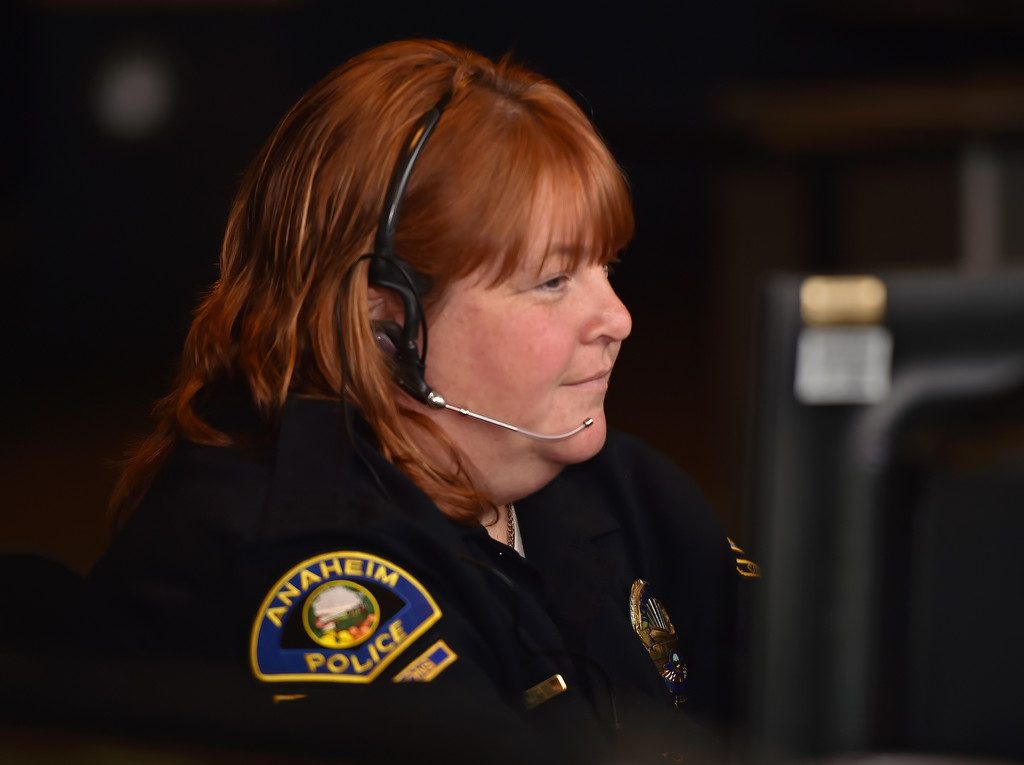
Dispatcher Jennifer Jones at an Anaheim PD 911 dispatch station. Photo by Steven Georges/Behind the Badge OC
The unit currently is understaffed, said Wallace, who oversees five communications supervisors, four senior dispatchers and 26 full-time dispatchers. There currently are five dispatcher openings. The APD will fill them in a couple of weeks, Wallace said, but it will take a year for each of them to become fully trained.
Also, the nature of the job is changing.
A couple of decades ago, dispatchers sent officers on calls, and that was pretty much that.
These days, said Wallace, members of the public increasingly call dispatchers to complain about such social issues as homeless encampments. And dispatchers increasingly assist officers in the field by doing basic background checks on suspects for warrants and other issues.
“Just as police officers increasingly are being pulled in different directions,” Wallace said, “so are dispatchers.”
There is a nationwide push, he said, for the job of dispatcher to be reclassified from a clerical position to a public safety position, which could have ramifications for retirement and other benefits.
Another challenge: The advent of cell phones has translated to an increased volume of 911 calls, with about 75 percent of all 911 calls in Anaheim now coming from cell phones.
APD dispatchers, who work 12½-hour shifts with a one-hour break, now process about 600,000 calls a year. About 180,000 to 190,000 of these are 911 calls. Of the 911 calls, maybe 25 percent are true emergencies.
Beginning in around 2006, the APD started experiencing a marked increase in 911 calls, Wallace said.
In 1997, the agency’s dispatchers processed 128,530 911 calls. Last year, APD dispatchers processed 150,581 911 calls, which is on the low end when compared to 190,000-plus in 2012.
It used to be that all 911 calls made from cell phone went directly to the California Highway Patrol. Some still do, of course, but beginning in the late 1990s and early 2000s, such calls went to agencies located near where the calls were coming from.
The nature of 911 calls from cell phones is evolving, which will require further training for dispatchers, Wallace said. The APD is in the process of working with other 911 centers in O.C. to figure out a uniform system of dealing with 911 texting, which is about a year away, and the ability of people to text pictures and videos to 911, which is still a few years away.
“Those will be the next evolutions of 911 calls,” Wallace said.
Regarding cell phones, the public seems to believe that if they make a 911 call on their cell phone, dispatchers know exactly where they are.
Not so, Wallace said.
On newer cell phones, 911 calls yield between 90 and 95 percent accuracy within 10 meters, he said. This gives dispatchers a very good idea of where the call is coming from, but in a large setting like a college campus or an apartment complex, more information is needed to get officers to where they need to go.
John Carter, an APD dispatch supervisor, said quality-assurance checks are routinely done to make sure dispatchers are providing the best service possible.
He says the job can wear on dispatchers, who deal with the worst moments of people’s lives constantly throughout a shift.
“You can get desensitized to all the bad stuff that happens,” Carter said. “When I get home, I don’t watch the news. Dispatchers experience a lot of the ugliness in the world. It’s important to have a healthy outlet.”
Added Johnson: “You need a high level of emotional intelligence not to take things personally.”
Although today marks the beginning of national dispatcher appreciation week, when dispatchers can bask in all the good vibes, at times they don’t have to wait once a year to hear kudos.
Johnson recalled a therapist who phoned the APD’s business line to tell him she had a suicidal client.
At the end of the call, she told Johnson: “Hey, I just want to let you know I appreciate what you do.”
Said Johnson: “It’s nice when you hear that.”
 Behind the Badge
Behind the Badge
